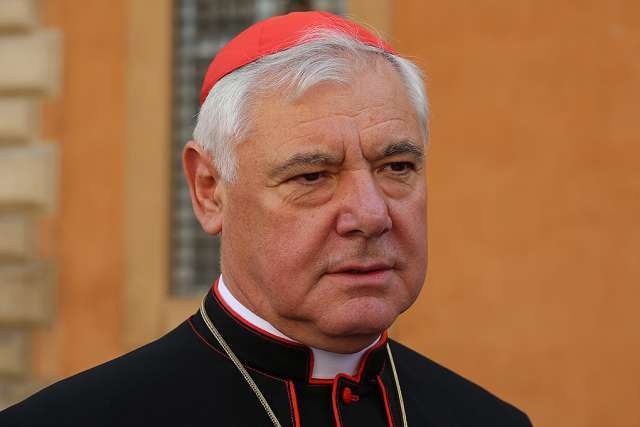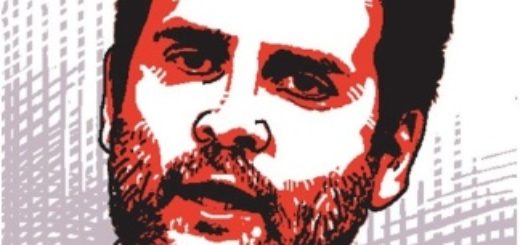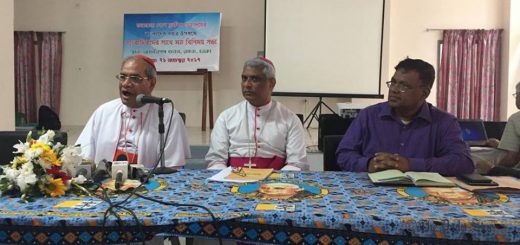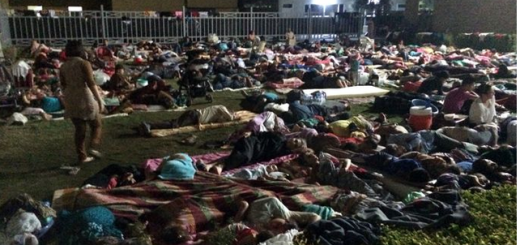Inside the Vatican Magazine – Cardinal Mueller

Letters from the Journal of Dr Robert Moynihan
Friday, September 29, 2017
[Note: Another letter from Dr Robert Moynihan, on a recent interview with Cardinal Gerhard Mueller, who was dismissed on July 1 by the Pope, as Prefect of the Congregation for the Doctrine of Faith. The Congregation for the Doctrine of the Faith (Latin: Congregatio pro Doctrina Fidei; CDF) is the oldest among the nine congregations of the Roman Curia. It was founded to defend the church from heresy; today, it is the body responsible for promulgating and defending Catholic doctrine. Isaac Gomes, Church Citizens’ Voice].
Founder and Editor
Inside the Vatican Magazine
First, the new interview everyone is reading: Cardinal Gerhard Mueller
Dismissed on July 1 by Pope Francis as Prefect of the Congregation for the Doctrine of the Faith, Cardinal Mueller — who was the second-highest doctrinal authority in the Church until July 1, and who remains the General Editor of the Opera Omnia of Pope Benedict XVI, which means he is very close to Pope Benedict — talked recently to Edward Pentin of the National Catholic Register.
The interview was conducted on September 13 and published on September 28. The text is here.
What are the 10 main points?
(1) First, on the reasons for his own dismissal by Francis. He tells us no reasons were given, but he also gives us an insight into some of the curial gossip prior to his dismissal:
Cardinal Mueller: I don’t know because no explanation was offered to me. The Pope only saw me at a routine private audience, at the end of my term, to discuss the work of the congregation, and said, “That is all.” All other explanations in the mass media are speculations. It is true that some time ago the Pope told me that some of his “friends” had been saying that “Müller is an enemy of the Pope.” I suppose these were anonymous accusations, and the anonymity of the accusers suggests that they were not prepared to have their arguments exposed to the light of honest and open discussion. The use of such underhanded tactics is always detrimental to the life of the Church and to the functioning of the Curia. Looking at history, we see that courts are often blighted by such intrigues, and this is something that the Pope himself has condemned very strongly as a longstanding evil in the Roman Curia. He assured me that no credence should be given to such gossip.
(2) Second, what Mueller sees as the "biggest danger" today for Pope Francis:
Cardinal Mueller: The biggest danger to the Pope these days are these opportunists, careerists and false friends who are concerned not for the good of the Church, but for their own financial interests and self-advancement.
(3) Third, Mueller believes that Amoris Laetitia can be read in an entirely orthodox way, without doctrinal error:
Cardinal Mueller: The only true and correct interpretation of Amoris Laetitia — which on the whole is very good and in favor of matrimony — is the orthodox interpretation, by which we mean to say: It is in the line of holy Scripture, apostolic Tradition and the definite decisions of the papal and episcopal magisterium, which is continuous up to now. Nowhere in Amoris Laetitia is it demanded by the faithful to believe anything that is against the dogma because the indissolubility of marriage is very clear. The only question is whether, in some cases, true matrimony exists in today’s context, in a culture where the definition of matrimony is very different from what the Church is teaching.
(4) Fourth, that an atmosphere of "great fear" does reign today in much of the Roman Curia, because of "in-fighting" and jockeying for position among curial officials. It is not very edifying, but this is what Mueller said:
Cardinal Mueller: I heard it from some houses here, that people working in the Curia are living in great fear: If they say one small or harmless critical word, some spies will pass the comments directly to the Holy Father, and the falsely accused people don’t have any chance to defend themselves. These people, who are speaking bad words and lies against other persons, are disturbing and disrupting the good faith, the good name of others whom they are calling their brothers.
The Gospel and the words of Jesus are very strong against those who denounce their brothers and who are creating this bad atmosphere of suspicion. I’ve heard that nobody speaks; everyone is a little afraid because they can be snitched on. It’s not the behavior of adult people, but that of a boarding school.
(5) Fifth, his comments on the present criteria for being made a bishop, which makes clear, implicitly, that the candidate's attitude toward Amoris Laetitia — and especially toward Footnote 351, which says that divorced and remarried people should in some cases be able to receive communion — is an important factor right now:
Cardinal Mueller: A certain interpretation of the document’s Footnote 351 cannot be criteria for becoming a bishop. A future bishop must be a witness to the Gospel, a successor of the apostles, and not only someone who repeats some words of a single pastoral document of the Pope without a mature theological understanding.
(6) Sixth, a reflection on the overall doctrinal authority of the Pope.

(A photo of Pope Francis with Cardinal Mueller in better times)
Mueller is quite clear here, that no one is obliged to "accept uncritically" anything the Pope says about matters in the political or scientific realm — though such words should be "respected" because "they are opinions and words of the Holy Father." Here is the passage:
Cardinal Mueller: We must distinguish between what is official doctrine of the Church, the role of the Pope, and what he is saying in private conversations. Those private opinions of the Pope need to be respected because they are opinions and words of the Holy Father, but nobody is obliged to accept uncritically everything that he’s saying, for example, about political or scientific questions. That’s his personal opinion, but nothing to do with our Catholic faith, by which we are justified in the grace of God.
(7) Seventh, once again, on the "dubia" and the criticism of Amoris Laetitia. Here, Mueller is at pains to make clear that the critics of the document's teaching are not critics of Pope Francis himself and his mission, but critics of ambiguous and possibly dangerous formulations in the document. But this clearly implies (it would seem) that the criticism is being seen in this light by the Pope and his circle. Here is what Mueller says:
Cardinal Mueller: Everyone who becomes bishop, cardinal or Pope must learn to distinguish between the critics who are against the person and critics against the mission you have. The Holy Father, Francis, must know that it is important one accepts his intention: to help those people who are distant from the Church, from the belief of the Church, from Jesus Christ, who wanted to help them… This discussion is not against him, it is not against his intentions, but there is need of more clarification. Also, in the past, we had discussions about the faith and the pastoral application of it. It’s not the first time this has happened in the Church, and so why not learn from our long experiences as Church, to have a good, profound discussion in promoting the faith, the life of the Church and not to personalize and polarize? It’s not a personal criticism of him, and everybody must learn it and respect his high responsibility. It is a very big danger for the Church that some ideological groups present themselves as the exclusive guardians of the only true interpretation of Amoris Laetitia. They feel they have the right to condemn all people of another standpoint as stupid, rigid, old-fashioned, medieval, etc.
(8) Eighth, the "Mueller proposal," much-discussed in the past few hours, but seemingly not taken very seriously by anyone close to Francis, to set up a discussion committee to work out how to resolve the problems raised byAmoris Laetitia and its critics. Here is Mueller's proposal:
Cardinal Mueller: What the Church needs in this serious situation is not more polarization and polemics, but more dialogue and reciprocal confidence. The Holy Father and all good shepherds are wishing the full integration of couples in irregular situations. But this must happen according to the general conditions of the worthy and valid reception of the holy sacraments. We must avoid new schisms and separations from the one Catholic Church, whose permanent principle and foundation of its unity and communion in Jesus Christ is the actual Pope Francis and all bishops in full communion with him. The Successor of St. Peter deserves full respect for his person and divine mandate, and, on the other hand, his honest critics deserve a convincing answer. A possibility of the solution could be a group of cardinals engaged by the Holy Father to begin a theological disputation with some prominent representatives of the dubia and the “corrections” about the different and sometimes controversial interpretation of some statements in Chapter 8 of Amoris Laetitia.
(9) And then, this blockbuster conclusion:
Cardinal Mueller: Nobody can demand of a Catholic to believe a doctrine which is in an obvious contradiction to the Holy Scripture, apostolic Tradition and the dogmatic definitions of the Popes and ecumenical councils in the matter of faith and morals. What is needed is a religious obedience, but not a blind faith, to the Pope and the bishops, and nothing at all to private friends and advisers.
Could he be any clearer?
We should keep these words in mind…
(10) And, as Mueller closes, he re-underlines his basic point: that Catholic doctrine is not "invented" but "developed" — from Revelation, from Scripture — and that this "development" must be organic, not inventive somersaults, not ruptures, not revolutionary. This is what he says:
Cardinal Mueller: These people [the Pope’s close advisors] must come out with their arguments, and they are not allowed to demand any respect for their presumed magisterial authority. We do not just believe things because a Pope teaches them, but because these truths are included in Revelation (cf. II.Vatican Council, Dei Verbum, 10).
And that is all… so Mueller interview ends.
Well worth reading in its entirety…

















